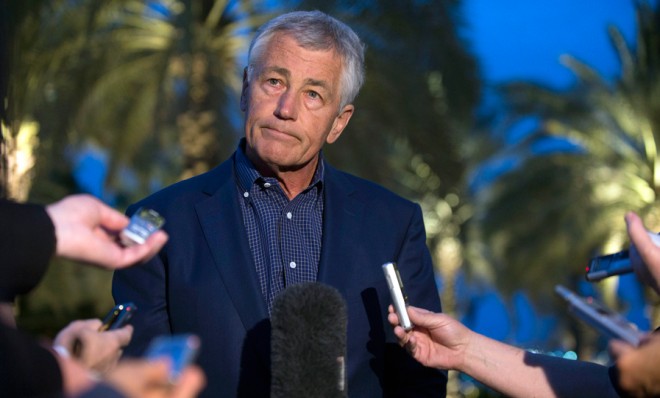The U.S. believes Syria has used chemical weapons: Now what?
The Obama administration has proclaimed chemical weapons a "red line"

A free daily email with the biggest news stories of the day – and the best features from TheWeek.com
You are now subscribed
Your newsletter sign-up was successful
In March, the bloodiest month of Syria's two-year civil war, rebels accused Syrian president Bashar al-Assad of using chemical weapons — a "red line" that the Obama administration previously said would provoke a U.S. response. Now the White House has announced that it has evidence that the Assad regime has used chemical weapons at least twice during the course of the war. So what happens now? Here, a guide to the latest developments in the conflict:
What is the evidence?
"Our intelligence community does assess with varying degrees of confidence that the Syrian regime has used chemical weapons on a small scale in Syria, specifically the chemical agent sarin," read a letter to Congress from the White House, according to The Associated Press.
The Week
Escape your echo chamber. Get the facts behind the news, plus analysis from multiple perspectives.

Sign up for The Week's Free Newsletters
From our morning news briefing to a weekly Good News Newsletter, get the best of The Week delivered directly to your inbox.
From our morning news briefing to a weekly Good News Newsletter, get the best of The Week delivered directly to your inbox.
The administration's conclusion partly comes from "physiological evidence," according to USA Today, though Defense Secretary Chuck Hagel declined to elaborate further when asked about the evidence at a press conference in Abu Dhabi. However, an unidentified U.S. intelligence official told Wired the evidence came from Syrian blood samples that tested positive for sarin.
Several days earlier, an Israeli military official strongly asserted that Assad had used chemical weapons, citing photos of people foaming at the mouth and unspecified "direct" findings, according to The New York Times. The U.K. Foreign Ministry has also said that it has "limited but persuasive information from various sources" that Syria has deployed such weapons, according to the BBC.
Ultimately, however, it might be impossible to confirm Syria has crossed that red line without having inspectors on the ground, Hamish de Bretton-Gordon, former commanding officer of the British army's chemical weapons unit, told The Guardian.
Is this a surprise?
A free daily email with the biggest news stories of the day – and the best features from TheWeek.com
No. Syria is one of six countries not to join the Chemical Weapons Convention, which bans the use of chemical weapons in warfare. The country is believed to have one of the largest stockpiles of chemical weapons in the world, which are guarded by an elite unit of the Syrian military, according to The Wall Street Journal.
What is sarin?
According to the Centers for Disease Control and Prevention, sarin is a clear, odorless, and tasteless liquid that can be released in gas form, and can cause paralysis, convulsions, and, in large doses, death. It was used by a religious cult in the 1995 attack on the Tokyo subway that killed 13 people.
The nerve agent, originally developed by German scientists in 1938 as a pesticide, was also used by Saddam Hussein in the 1988 Halabja massacre that killed at least 5,000 ethnic Kurds.
How will the United States react?
The White House is still hesitant to get involved in Syria. Hagel, speaking with CNN, certainly didn't sound like someone eager to put boots on the ground:
We need all the facts. We need all the information. What I've just given you is what our intelligence community has said they know. As I also said, they are still assessing, and they are still looking at what happened, who was responsible and the other specifics that we'll need. [CNN]
Sen. John McCain (R-Ariz.), the Senate's leading proponent for intervention in Syria, was far more hawkish, telling the AP that "it's pretty obvious that that red line has been crossed." He also called for the United States to "provide a safe area for the opposition to operate, to establish a no-fly zone, and provide weapons to people in the resistance who we trust."
House Intelligence Committee Chairman Mike Rogers (R-Mich.) said it may become necessary for the U.S. to use military force. "If in fact we prove beyond a shadow of doubt that they have used these chemical weapons, I think we are morally obligated to do something," he told The Hill. "If that was a limited military strike to do that, I think we're obligated to do that if in fact they've crossed the president's red line of chemical weapons use."
Despite the evidence, the White House will probably do everything in its power not to get involved, writes TIME's Michael Crowley: "After withdrawing from Iraq, Obama has zero appetite for another vicious sectarian Middle East conflict — particularly one so geopolitically charged it could make Afghanistan seem like a ribbon-cutting ceremony."
Rebels in Syria have been seeking direct military assistance from the United States and other Western countries, but so far those countries have been reluctant to get too involved in a conflict that, according to the U.N., has resulted in around 70,000 deaths.
Keith Wagstaff is a staff writer at TheWeek.com covering politics and current events. He has previously written for such publications as TIME, Details, VICE, and the Village Voice.
-
 Local elections 2026: where are they and who is expected to win?
Local elections 2026: where are they and who is expected to win?The Explainer Labour is braced for heavy losses and U-turn on postponing some council elections hasn’t helped the party’s prospects
-
 6 of the world’s most accessible destinations
6 of the world’s most accessible destinationsThe Week Recommends Experience all of Berlin, Singapore and Sydney
-
 How the FCC’s ‘equal time’ rule works
How the FCC’s ‘equal time’ rule worksIn the Spotlight The law is at the heart of the Colbert-CBS conflict